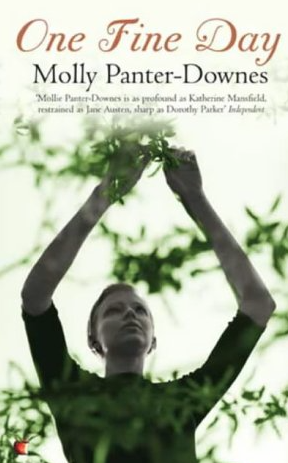
Mollie Panter-Downes was a British novelist and columnist. She’s well-known for her novel One Fine Day and her wartime short story collection Good Evening, Mrs. Craven.
One Fine Day is set on a summer’s day in 1946. It follows one day in the lives of Laura and Stephen Marshall and their young daughter, Victoria. During the war, Stephen was away like most men, while Laura and Victoria, together with other women and their children lived at their big house in the village of Wealding. While the Marshalls haven’t lost anyone during the war, they are still reeling. Their marriage suffers from the strain that comes with the changes in their way of life. Belonging to the upper-class, they were used to have servants: cooks, maids, gardeners. During the war, a lot of the servants left, died or moved on and only a very few were willing to return. Taking care of a big house and garden is clearly not what Laura was meant for. She makes a poor job of it and the house and people inhabiting it grow shabbier every day. While Stephen was gone, nobody minded the chaos, but now that he’s back, Laura feels she has to make an effort and mourns her loss of freedom.
Stephen hopes that things might get back to normal soon and before he leaves the house that morning, he begs Laura to go and look for a new gardener.
The book changes the point of view a few times, but mostly we follow Laura’s outer and inner life. She goes to the small village to buy food – no small feat as there’s still rationing and there’s hardly any choice. Then she prepares dinner, which takes her ages. Every household chore takes ages and is never done to satisfaction. The war and the house have taken their toll. She’s constantly tired. She’s thirty-eight but feels and looks much older.
A large part of the day is dedicated to hunting Stuffy, the Marshalls’ small dog, who has run away. When she goes to find her, she takes this opportunity and makes an excursion up a hill from which she can see the beautiful English landscape and savour an intense moment of solitude.
One Fine Day reminded me a lot of Carr’s A Month in the Country, only the time is even more condensed. The richness doesn’t lie in the plot but in the inner lives of the people and the lyrical descriptions of a beautiful, hot English summer day.
What a morning! Later it would be very hot, but now the dew frosted the gray spikes of the pinks, the double syringa hung like a delicious white cloud in the pure air. The cat sat with her feet close together on the unmown grass, and suddenly, sticking out a stiff back leg, ran her mouth up and down as though playing a passage on the flute. Summer at last, thought Stephen, and about time too. London wold be an oven.
The beauty and warmth of the day affect all the characters. It makes them live intensely and hold still for a few moments. There’s a lot wrong with the life they are living. They are not equipped for it and the spouses have grown apart. But this beautiful day revives them, makes them appreciate what they have, makes them wish to get closer again. The end is uncertain, because in uncertain times, hopes and wishes are easily squashed. While we are not sure they will be able to make it – as people, as a couple – there’s hope.
The novel is gentle but outspoken. The characters hope and dream but they are realistic. They see things the way they are, notice the marks the war has left. Laura who knows she’s lost her looks, tries to strive for charm instead. Or here – an early description of Wealding that used to be
( . . . ) the perfect village in aspic, at the sight of which motorists applied their brakes, artists happily set up easels ( . . . )
Those days are gone and now Wealding is
It’s perfect peace was, after all, a sham. Coils of barbed wire still rusting among the sorrel were a reminder. Sandbags pouring out sodden guts from the old strong-point of the bracken, the frizzy lily spikes pushing up in the deserted garden of the bombed cottage, ( . . .)
One Fine Day is intense and lyrical, a novel for those who like introspective books and don’t need a lot of action. But it’s also masterful because of the delicate way Mollie Panter-Downes uses motifs and other recurring elements that reinforce the themes of loss, change and – more positively – transformation. And how she juxtaposes the lives of her two main characters, who undergo, in one single day, a whole transformation, believing at first that they each want what the other has – an independent life, leisure to savour what a day brings -and then discover – it’s already there – they just have to grab it.
I first came across this novel on Danielle’s blog here.
Just an aside – I’m not sure why it says Molly on this book cover, as she’s clearly called Mollie and my edition – same picture – says Mollie.
